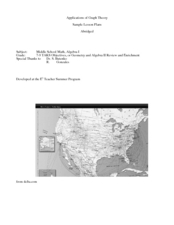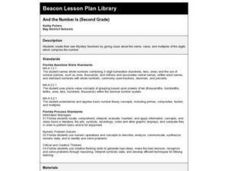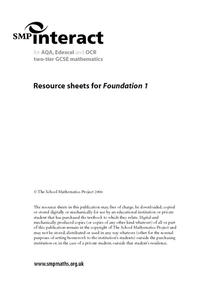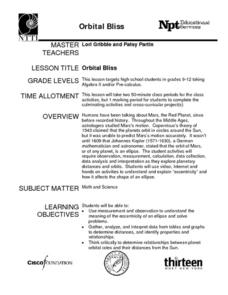Curated OER
Number Theory - Week 12
In this number theory worksheet, students study integers and their properties. They explore the Fibonacci Sequence and approximate irrational numbers. This two-page worksheet contains eight problems.
Curated OER
Divisibility Rules Using Scientific Calculators
Young learners apply divisibility rules to determine if a number is a factor of another number. They discuss what numbers are factors of another number and identify patterns using divisibility rules.
Curated OER
Math Club #16: Knot Theory
In this math club #16: knot theory worksheet, 9th graders read about knot theory, analyze diagrams of knots, make knots to match the diagrams and answer 6 questions about advanced knots.
Curated OER
Fibonacci II
Study Fibonacci sequences and see a related set of numbers. Learn and review Lucas numbers and use of quadratic equations to find a general term of a sequence of numbers that is generated by a recurrence relation similar to Fibonacci's.
Curated OER
Application of Graph Theory
Students investigate different online tutorials as they study graphing. In this graphing lesson, students apply the concept of graphs cross curricular and use it to make predictions. They define the purpose and theories behind graphs.
Old Dominion University
Introduction to Calculus
This heady calculus text covers the subjects of differential and integral calculus with rigorous detail, culminating in a chapter of physics and engineering applications. A particular emphasis on classic proof meshes with modern graphs,...
Curated OER
And the Number Is (Second Grade)
Second graders create Mystery Numbers. They give the class clues about the name, value, and multiples of the digits which make up the number.
Curated OER
Theory of Polynomials
In this theory of polynomials worksheet, learners solve nine problems total related to polynomials. In this first part, they use synthetic division to find the quotient, and the remainder if there is a dividend and a divisor. In the...
EngageNY
Polynomial, Rational, and Radical Relationships
This assessment pair goes way beyond simple graphing, factoring and solving polynomial equations, really forcing learners to investigate the math ideas behind the calculations. Short and to-the-point questions build on one another,...
Curated OER
Union and Intersection of Sets
In this Algebra I/Algebra II instructional activity, students determine the intersection and union of sets and solve problems with Venn diagrams. The three page instructional activity contains a combination of seventeen multiple...
Curated OER
Geo Jammin' By Design - Day 7, Lesson 38: Kool Cups
Create geometric cups by interpreting directions, informational text, and mathematical concepts. Critical thinkers apply geometric theory (congruent shapes, patterns, symmetry) to actual directions to create a cup that holds Kool Aid....
Curated OER
Black Holes....II
In this black hole worksheet, students use the equation for time dilation to solve 8 problems including determining the time it takes to receive a GPS signal from space, the time delay for the GPS-Earth system, the distance a radio...
Alabama Learning Exchange
As If Numbers Weren't Complex Enough Already!
The class explores the concept of complex numbers on a website to generate their own Mandelbrot sets. They will practice performing operations with complex numbers and then to get a visual understanding, graph the absolute value of a...
School Mathematics Project
Resource Sheets
This extensive and far-reaching collection of worksheets puts a new twist on many basic concepts. Learners use multiplication to trace a path from one point to another, tile a plane by converting between improper and proper fractions,...
Curated OER
Orbital Bliss
Most young mathematicians are aware that the planets don’t orbit the sun in a circle but rather as an ellipse, but have never studied this interesting feature. This resource looks at the planetary orbits in more detail and helps learners...
Curated OER
Napolean Triangle
Students investigate the Napoleon triangle theory. In this polygon lesson, students differentiate between the boundary points, interior and lattice point of a polygon. They apply concepts of equilateral triangles to solve...
Curated OER
Flying with Fractions
Students test their knowledge of the Wright Brothers and their aircraft, and compute ratio of two numbers to determine the ratio between wing span and length of aircraft.
EngageNY
Adding and Subtracting Rational Expressions
There's a fine line between a numerator and a denominator! Learners find common denominators in order to add and subtract rational expressions. Examples include addition, subtraction, and complex fractions.
Curated OER
Fibonacci I
Fifth graders have the opportunity to gather information themselves on Fibonacci and on the occurrence of Fibonacci numbers in nature. They divide up into groups of 2 to 4 to research.
Curated OER
Birthday Problem
Young scholars identify the probability of an event occurring. Learners explore the complement of an event in finding why an event will not happen. They also explore basics of probability within algebra.
Curated OER
Zoom Out
Students explore visual perception and how objects change as distance changes. In this distance and vision instructional activity, students practice their scientific inquiry skills. Students practice drawing objects from different points...
University of Waterloo (Canada)
University of Waterloo: Cemc: Math Circles: Number Theory Ii [Pdf]
This learning exercise provides a series of problem-solving questions that require higher order thinking skills. Questions will include finding the greatest common divisor, and least common multiple.
University of St. Andrews (UK)
University of St. Andrews: Thomas Bayes
Biographical information on Thomas Bayes, mathematician who worked on the theory of probability.
Texas Instruments
Texas Instruments: Numb3 Rs: Guarding the Goods (Part I)
Based off of the hit television show NUMB3RS, this lesson introduces students to the Art Gallery Problem, in which the number of guards necessary to guard a two-dimensional space (the "art gallery") must be found. This lesson keeps the...





















![University of Waterloo: Cemc: Math Circles: Number Theory Ii [Pdf] Unknown Type University of Waterloo: Cemc: Math Circles: Number Theory Ii [Pdf] Unknown Type](https://d15y2dacu3jp90.cloudfront.net/images/attachment_defaults/resource/large/FPO-knovation.png)

